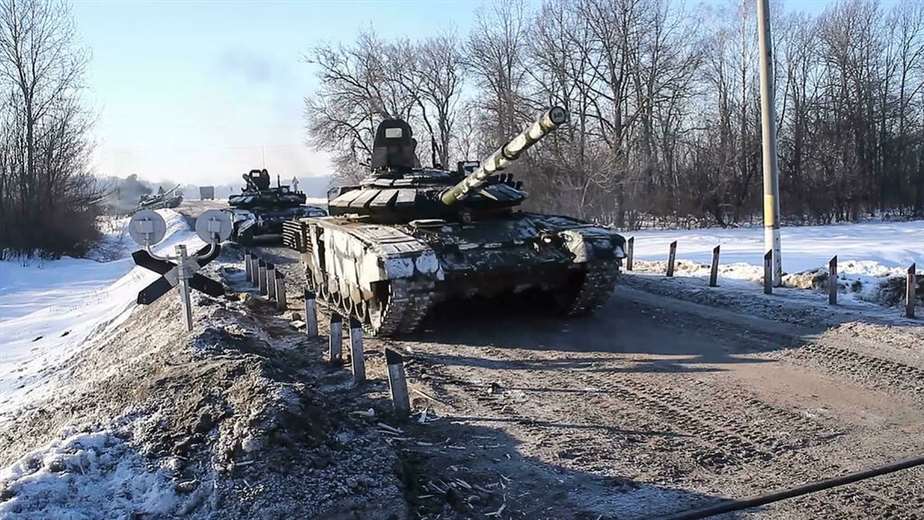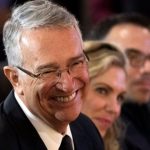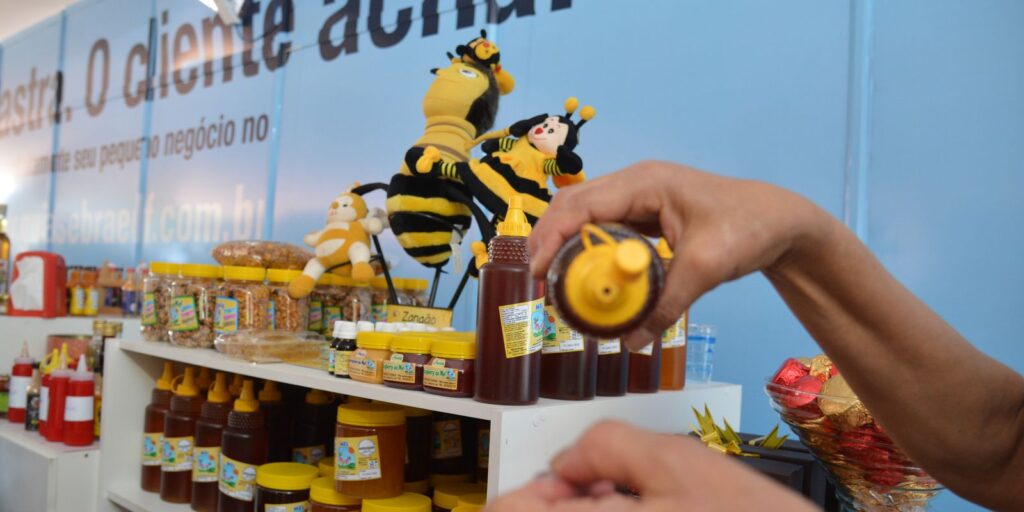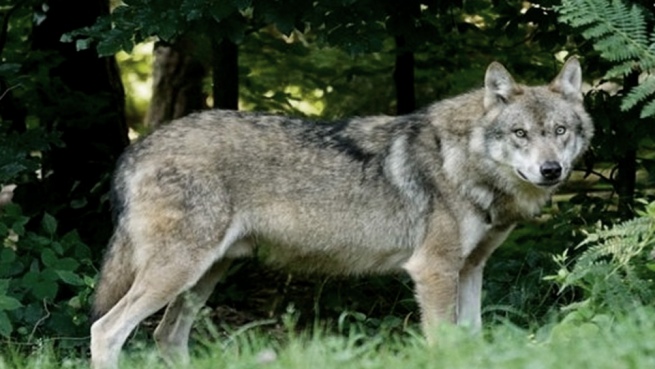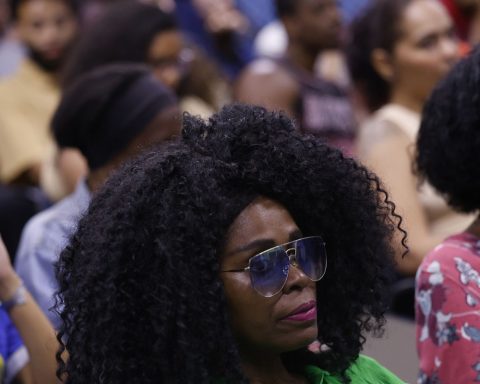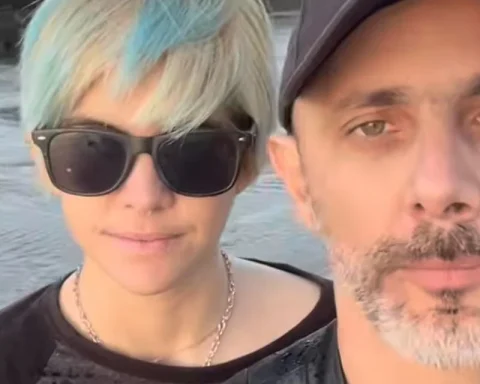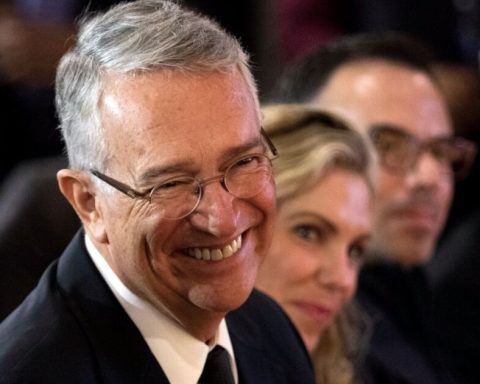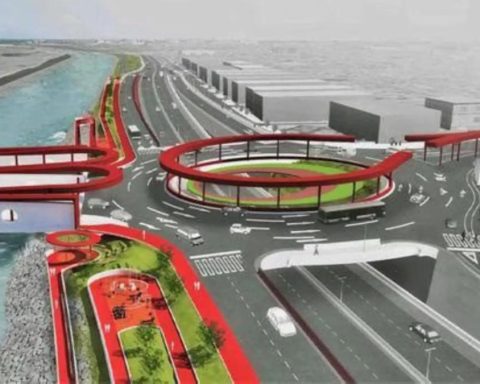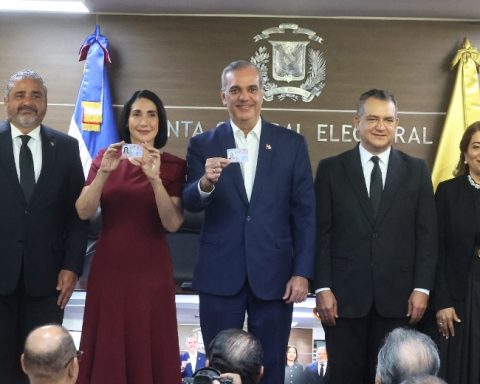Ukraine celebrates this Wednesday a “Day of Unity”, declared by its president in the face of the threat of a Russian invasion, while Russia’s partial military withdrawal from Ukraine’s borders raises cautious hopes of getting out of the crisis.
Is the imminent danger of a conflict between Russia and the West receding? after weeks of fears about the concentration of Russian troops around Ukraine?
On Wednesday, in a new sign of de-escalation after similar announcements the day before, The Russian army announced the end of the exercises and the departure of the soldiers deployed in the annexed peninsula of Crimea, in the south of Ukraine.
The Russian Ministry of Defense released a video about the return of the troops, in which wagons loaded with military equipment are seen crossing the railway bridge that connects Crimea with Russia at night.
The West has been warning for weeks that Russia, which has massed tens of thousands of troops around Ukraine and has staged numerous military exercises, could attack. European and US leaders, who are stepping up diplomatic talks, have warned that massive economic sanctions are on the cards if Moscow acts, but Moscow denies any desire to invade.
Despite signs of de-escalation from Russia, the NATO Secretary General, Jens Stoltenberg, stated that “there is no de-escalation on the ground at this time” and that “Russia continues to strengthen its military presence” near Ukraine.
In parallel, IUkrainians celebrate the “Unity Day” declared by their president, Volodymyr Zelenskywith flags unfurled by the authorities and the inhabitants of Kiev.
This Wednesday, the Ukrainian president has planned military maneuvers in the Rivne region (west). Then, he will go to Mariupol, the last big city in the east controlled by Kiev and considered one of the most threatened in case of invasion because it is located only about 20 kilometers from the front line with the pro-Russian separatists.
Ukraine’s richest man, oligarch Rinat Akhmetov, will also be in Mariupol. Another billionaire, Viktor Pintchuk, will visit his hometown of Dnipro (east-central Ukraine). On Monday, President Zelensky urged oligarchs and politicians who had left Ukraine to return within 24 hours as a sign of the country’s unity.
President Zelensky chose the date for “Unity Day” in response to reports from US intelligence services that suggested the invasion of the country could take place on Wednesday.
Ukraine also announced on Wednesday that its military attache had attended Russian-Belarusian exercises in Belarus, which had been held near the Ukrainian border, raising fears of an invasion.
Minsk has also assured that all Russian soldiers deployed on its territory will leave the country at the end of these exercises, on February 20.
western wariness
Since the start of the Russian troop withdrawal was announced on Tuesday, the West has remained very cautious.
The withdrawal “would be positive”, but it has not yet been verified, reacted US President Joe Biden, judging that the Russian troops are in “a threatening position” and that “an invasion is still very possible”.
German Chancellor Olaf Scholz, who was received on Tuesday by Vladimir Putin, he welcomed “a good sign” and considered that things could evolve “positively”.
The Russian president reiterated that he did not want a war, while insisting that NATO expansion was a threat to Russia.
“There is one fact: Ukraine’s accession to NATO is not on the agenda,” he said. Scholz. “We cannot have a possible military conflict over an issue that is not on the agenda.
Toning down a bit, Biden reached out to his Russian counterpart on Tuesday: “We have to give diplomacy every chance.
“It is positive that the US president has also expressed his willingness to negotiate seriously,” said Kremlin spokesman Dmitry Peskov.
According to him, the talks will be “very difficult.” For Russia, they should lead to a review of the European security architecture.
“It will be very difficult, it will require a lot of flexibility on both sides, political will,” he said.
Moscow regrets the West’s rejection of its main demands, namely the end of the Alliance’s enlargement policythe commitment not to deploy offensive weapons near Russian territory and the withdrawal of NATO infrastructure from Eastern Europe.
In exchange, the West proposed talks on issues such as arms control, visits to sensitive facilities and discussions of Russia’s security concerns.
Source: AFP.
Ukraine celebrates this Wednesday a “Day of Unity”, declared by its president in the face of the threat of a Russian invasion, while Russia’s partial military withdrawal from Ukraine’s borders raises cautious hopes of getting out of the crisis.
Is the imminent danger of a conflict between Russia and the West receding? after weeks of fears about the concentration of Russian troops around Ukraine?
On Wednesday, in a new sign of de-escalation after similar announcements the day before, The Russian army announced the end of the exercises and the departure of the soldiers deployed in the annexed peninsula of Crimea, in the south of Ukraine.
The Russian Ministry of Defense released a video about the return of the troops, in which wagons loaded with military equipment are seen crossing the railway bridge that connects Crimea with Russia at night.
The West has been warning for weeks that Russia, which has massed tens of thousands of troops around Ukraine and has staged numerous military exercises, could attack. European and US leaders, who are stepping up diplomatic talks, have warned that massive economic sanctions are on the cards if Moscow acts, but Moscow denies any desire to invade.
Despite signs of de-escalation from Russia, the NATO Secretary General, Jens Stoltenberg, stated that “there is no de-escalation on the ground at this time” and that “Russia continues to strengthen its military presence” near Ukraine.
In parallel, IUkrainians celebrate the “Unity Day” declared by their president, Volodymyr Zelenskywith flags unfurled by the authorities and the inhabitants of Kiev.
This Wednesday, the Ukrainian president has planned military maneuvers in the Rivne region (west). Then, he will go to Mariupol, the last big city in the east controlled by Kiev and considered one of the most threatened in case of invasion because it is located only about 20 kilometers from the front line with the pro-Russian separatists.
Ukraine’s richest man, oligarch Rinat Akhmetov, will also be in Mariupol. Another billionaire, Viktor Pintchuk, will visit his hometown of Dnipro (east-central Ukraine). On Monday, President Zelensky urged oligarchs and politicians who had left Ukraine to return within 24 hours as a sign of the country’s unity.
President Zelensky chose the date for “Unity Day” in response to reports from US intelligence services that suggested the invasion of the country could take place on Wednesday.
Ukraine also announced on Wednesday that its military attache had attended Russian-Belarusian exercises in Belarus, which had been held near the Ukrainian border, raising fears of an invasion.
Minsk has also assured that all Russian soldiers deployed on its territory will leave the country at the end of these exercises, on February 20.
western wariness
Since the start of the Russian troop withdrawal was announced on Tuesday, the West has remained very cautious.
The withdrawal “would be positive”, but it has not yet been verified, reacted US President Joe Biden, judging that the Russian troops are in “a threatening position” and that “an invasion is still very possible”.
German Chancellor Olaf Scholz, who was received on Tuesday by Vladimir Putin, he welcomed “a good sign” and considered that things could evolve “positively”.
The Russian president reiterated that he did not want a war, while insisting that NATO expansion was a threat to Russia.
“There is one fact: Ukraine’s accession to NATO is not on the agenda,” he said. Scholz. “We cannot have a possible military conflict over an issue that is not on the agenda.
Toning down a bit, Biden reached out to his Russian counterpart on Tuesday: “We have to give diplomacy every chance.
“It is positive that the US president has also expressed his willingness to negotiate seriously,” said Kremlin spokesman Dmitry Peskov.
According to him, the talks will be “very difficult.” For Russia, they should lead to a review of the European security architecture.
“It will be very difficult, it will require a lot of flexibility on both sides, political will,” he said.
Moscow regrets the West’s rejection of its main demands, namely the end of the Alliance’s enlargement policythe commitment not to deploy offensive weapons near Russian territory and the withdrawal of NATO infrastructure from Eastern Europe.
In exchange, the West proposed talks on issues such as arms control, visits to sensitive facilities and discussions of Russia’s security concerns.
Source: AFP.
;
